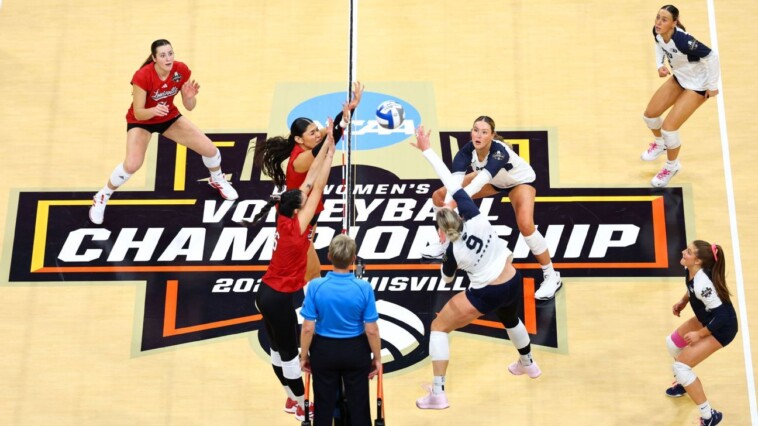-

Michael Voepel, ESPN.comDec 22, 2024, 08:24 PM ET
- Michael Voepel is a senior writer who covers the WNBA, women’s college basketball and other college sports. Voepel began covering women’s basketball in 1984, and has been with ESPN since 1996.
LOUISVILLE, Ky. — The Louisville Cardinals had the hometown advantage and won the most emotional set of Sunday’s NCAA women’s volleyball final. But Penn State won the other three sets and got the program’s eighth national championship at the KFC Yum Center in downtown Louisville.
Penn State’s Katie Schumacher-Cawley, who was diagnosed with breast cancer in September but has stayed with her team all season, became the first woman head coach to win the national championship since the NCAA tournament began in 1981.
“I’m inspired by the young kids that are sick,” Schumacher-Cawley said of children she sees who are dealing with cancer. “If I can be an inspiration, then I take that. But I feel good. I’m fortunate to be surrounded by so many great people.”
Schumacher-Cawley played for and was an assistant to Russ Rose, the legendary coach who guided the Nittany Lions to their seven other NCAA titles before retiring after the 2021 season. Schumacher-Cawley has somewhat downplayed being the first woman coach to win, but it was a milestone for the sport.
That historic first was guaranteed for this final, since Louisville is also coached by a woman, Dani Busboom Kelly. Both won NCAA titles as players, Schumacher-Cawley in 1999 with Penn State and Busboom Kelly with Nebraska in 2006.
“I’m very happy for Katie, and it’s a big deal for this sport,” Busboom Kelly said. “I’m thankful … that we can move on and that more women will be in this position in the future.”
All four No. 1 seeds made this final four, the fourth time since seeding began in 1993 that the tournament’s top four seeds got that far. Pitt and Nebraska were thought by many to be the favorites to advance to the championship match. Instead, Louisville beat ACC rival Pitt 3-1, and Penn State rallied for a 3-2 win against Big Ten rival Nebraska in Thursday’s semifinals.
On Sunday, a sellout crowd of 21,860 — a volleyball championship record — skewed primarily toward the Cardinals. They were playing for the title for the second time in program history, having lost to Texas in 2022. But without senior outside hitter Anna DeBeer, who suffered an ankle injury in Thursday’s semifinal, Louisville was at a disadvantage.
DeBeer, a Louisville native in her fifth year with the program, led the Cardinals in kills per set and points per set this season. It was too much of a personnel loss for Louisville to overcome, especially with Penn State senior Jess Mruzik playing at such a high level.
Mruzik, a fifth-year senior who spent her first three seasons at Michigan and then transferred to Penn State, had 29 kills and was named the tournament’s most outstanding player.
“I think what really clicked was when all my teammates started looking at me saying, ‘I have your back, swing away, let it rip,'” Mruzik said. “That just allowed me to play free.
“The standard at Penn State is winning national championships. So this is like a dream come true.”
The first set was close throughout, with Penn State winning 25-23. Then the Nittany Lions looked to be on their way to a 2-0 set advantage, up 24-19 in the second. But the Cardinals staged a remarkable stand, saving 10 set points before prevailing 34-32.
It was the most combined points ever in a set in the NCAA tournament, which went to rally scoring in the 2001 season. (Before that change, volleyball teams could score points only on their serve, and matches were to 15 points, needing to win by at least two).
But it took everything Louisville had to win that second set. Penn State came back to win the next two, 25-20 and 25-17, and the match.
“It was incredible,” Busboom Kelly said of the second-set rally. “I thought it gave us momentum, but unfortunately that didn’t show on the scoreboard.”
Meanwhile, Penn State really wasn’t unnerved by letting so many set points get away — in large part because the Nittany Lions had run out of the allowable number of subs late in that set, which forced some players to rotate into unfamiliar positions.
“After that second set, in the locker room the vibes were pretty good,” Mruzik said. “We were just laughing about what had just happened. We knew that we still had more left in the tank for the next two sets.”
Charitie Luper led the Cardinals with 21 kills. Busboom Kelly was emotional after the match talking about DeBeer, who didn’t get the chance to play in her final college match because of her injury. But Busboom Kelly was also upbeat about what this final four meant to the sport. For the second year in a row, the national championship match was on ABC.
“I think it just shows people want to watch volleyball, they want to watch women’s sports,” she said. “When you watch, it’s not just that they’re athletes. I think you can see the joy and the personalities and the way they play that makes our sport so much fun.”
This was just the second time an ACC team had played in the final. Louisville first did it in 2022. Stanford brought its record nine NCAA titles to the ACC this year, but the ACC is still waiting for its own breakthrough.
For Penn State, it ended a decade-long wait for its eighth title; the Nittany Lions last won in 2014 over BYU. They got this championship the hard way, by rallying from down 2-0 against Nebraska in the semifinals and then beating the Cardinals in their hometown in the final. Penn State middle blocker Taylor Trammell credited the Nittany Lions’ resolve in doing that. And teammate Camryn Hannah, who had 19 kills, credited Schumacher-Cawley for how she has guided them.
“As a woman in general, you’re always told you have to put all yourself into one thing,” Hannah said. “You have to be a mom and give 100% to that. You have to be a volleyball player. Katie teaches us that you can give 100% in every situation, but there are different times for everything.”
Mruzik added, “The biggest thing I am taking away from this season is you can do anything you set your mind to. I think with [Schumacher-Cawley] doing everything she’s doing, that helped us as a group also believe we were capable of this.”



